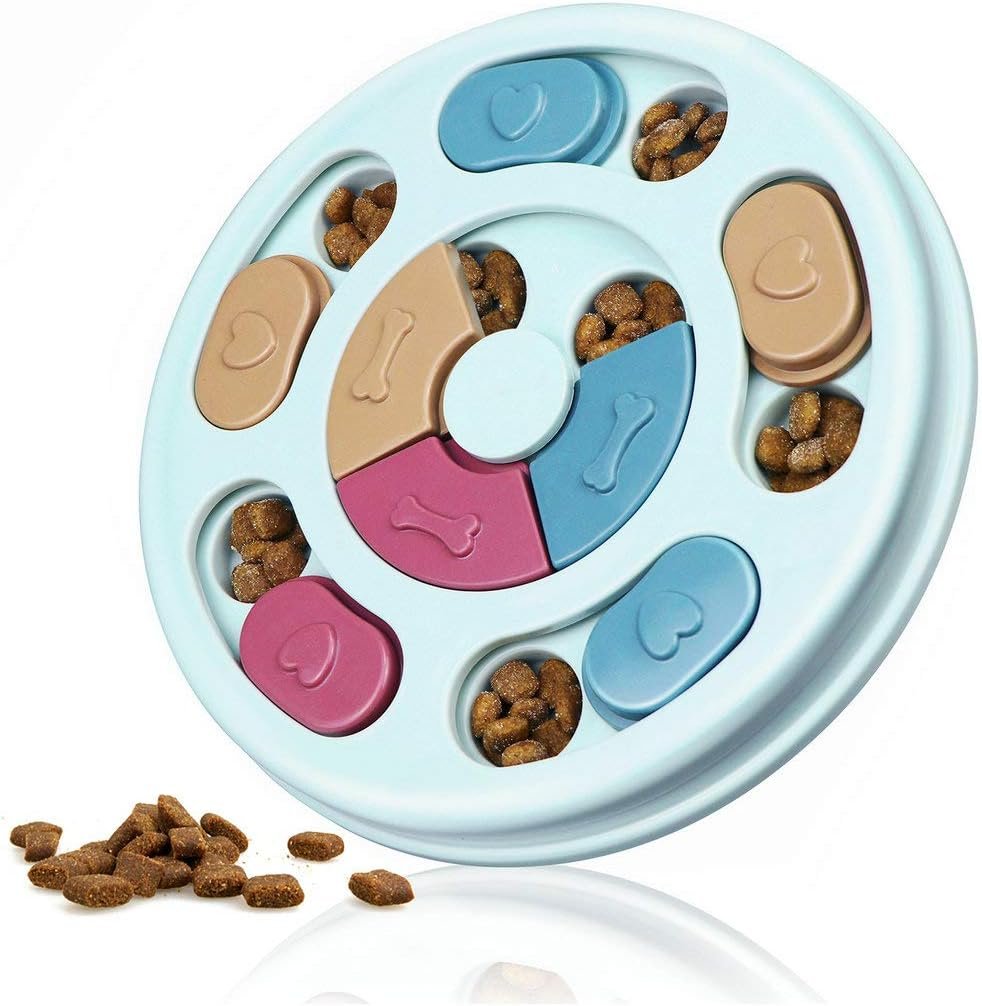
In recent years, there has been a growing interest in enhancing the cognitive skills of dogs through brain games. These games not only provide mental stimulation but also help improve problem-solving abilities, memory, and overall intelligence. Whether you have a puppy or an older dog, engaging them in brain games can be a fun and rewarding way to keep their minds sharp. In this article, we will explore the science behind brain games for dogs, how to choose the right games for your pup, training tips for maximizing cognitive benefits, and more.
Key Takeaways
- Brain games for dogs provide mental stimulation and help improve problem-solving abilities, memory, and overall intelligence.
- Choose brain games that are suitable for your dog’s age, breed, and skill level.
- Training your dog to play brain games can be a rewarding bonding experience.
- Make sure to keep the games fun and engaging to maintain your dog’s interest.
- Advanced brain games can provide an extra challenge for dogs who have mastered the basics.
Unleashing the Power of Canine Cognition

The Science Behind Brain Games for Dogs
Delve into the scientific underpinnings of Brain Training for Dogs, drawing parallels between canine and human cognitive processes. Understand how mental stimulation can enhance your dog’s problem-solving skills and overall cognitive abilities. Discover the fascinating research that supports the effectiveness of brain games in improving memory, focus, and learning in dogs. Explore the different areas of the brain that are activated during cognitive tasks and how they contribute to your dog’s intelligence.
Choosing the Right Brain Games for Your Pup
When it comes to choosing brain games for your furry friend, it’s important to consider their individual needs and preferences. Not all games are created equal, so take the time to find ones that will truly engage and challenge your dog’s cognitive skills. Keep in mind that different breeds and ages may have different preferences and abilities, so tailor the games to suit your pup.
One option is to implement a structured, quantitative data table to compare different brain games based on factors such as difficulty level, required time commitment, and the specific cognitive skills they target. This can help you make an informed decision and choose games that align with your dog’s abilities and interests.
Alternatively, you can use a bulleted list to highlight the key features and benefits of each brain game. This can make it easier to compare and choose games that will provide the most cognitive benefits for your pup.
Remember, the goal is to keep it fun and engaging for your dog. So, don’t be afraid to try out different games and see what your pup enjoys the most. And always remember to reward their efforts and celebrate their successes!
Training Tips for Maximizing Cognitive Benefits
Now that you understand the science behind brain games for dogs, it’s time to dive into some training tips that will help you maximize the cognitive benefits for your furry friend. Consistency is key when it comes to training your dog. Make sure to set aside dedicated time each day to engage in brain games. Reward your dog with treats or praise when they successfully complete a task, as this will reinforce their learning and motivation.
To keep things interesting, mix up the games you play with your dog. Introduce new challenges and puzzles to keep their brain sharp and engaged. Remember, variety is the spice of life, even for dogs!
In addition to mental stimulation, physical exercise is also important for your dog’s overall well-being. Take your dog for regular walks to provide both physical and mental stimulation. Walks allow your dog to explore new environments, encounter different smells, and engage their senses.
To further enhance your dog’s cognitive skills, consider incorporating interactive toys into their playtime. These toys require problem-solving and critical thinking, providing a fun and challenging experience for your pup. Rotate the toys to keep your dog engaged and prevent boredom.
Remember, brain games are not just for puppies. Dogs of all ages and breeds can benefit from cognitive stimulation. Whether you have a young and energetic pup or a wise and seasoned senior dog, brain games can help keep their minds sharp and their spirits high.
So, get ready to unleash the power of canine cognition and watch your dog thrive with these brain games!
Keeping it Fun: Engaging Your Dog in Brain Games

Engaging your dog in brain games is not only beneficial for their cognitive skills, but it can also be a fun and entertaining activity for both of you. Here are some tips to make sure you and your pup have a blast while exercising their brain:
- Mix it up: Dogs, like humans, can get bored easily. Keep things interesting by introducing a variety of brain games. From puzzle toys to hide-and-seek, there are endless options to choose from.
- Reward, reward, reward: Positive reinforcement is key when it comes to training your dog. Make sure to reward them with treats, praise, or playtime whenever they successfully complete a brain game. This will motivate them to keep trying and make the experience enjoyable.
- Challenge their senses: Dogs rely heavily on their senses, so incorporate games that stimulate their sense of smell, hearing, and sight. For example, you can hide treats around the house and encourage them to find them using their nose.
- Keep sessions short and frequent: Dogs have a limited attention span, so it’s important to keep brain game sessions short and frequent. This will prevent them from getting overwhelmed and ensure they stay engaged.
- Make it a bonding experience: Brain games are not only about exercising your dog’s brain, but also about strengthening the bond between you and your furry friend. Use this time to interact, play, and have fun together.
Remember, the key to keeping brain games fun is to tailor them to your dog’s preferences and abilities. Observe what they enjoy the most and adjust the games accordingly. With a little creativity and a lot of love, you and your dog can embark on an exciting journey of brain-boosting fun!
Brain Games for Different Breeds and Ages
When it comes to brain games, one size does not fit all. Different dog breeds and ages have different cognitive abilities and preferences. Tailor the brain games to suit your dog’s specific needs. For example, if you have a high-energy breed like a Border Collie, focus on games that involve physical activity and problem-solving. On the other hand, if you have an older dog, choose brain games that stimulate their senses and memory.
To help you choose the right brain games for your pup, here are some suggestions:
- Puzzle Toys: These toys require your dog to figure out how to get a treat or a toy out of a puzzle. They provide mental stimulation and keep your dog entertained.
- Hide and Seek: Hide treats or toys around the house and encourage your dog to find them. This game engages their sense of smell and encourages problem-solving.
- Interactive Games: Use interactive toys that require your dog to push buttons, pull levers, or solve puzzles to get a reward. These games challenge their cognitive skills and keep them mentally sharp.
Remember, the key to successful brain games is to make them fun and engaging for your dog. Keep the sessions short and rewarding, and always end on a positive note. With the right brain games, you can unleash the full potential of your dog’s cognitive abilities and have a blast together!
Challenging Your Dog’s Problem-Solving Skills
Now that your dog has mastered the basics of brain games, it’s time to take it up a notch and challenge their problem-solving skills. This is where the real fun begins! Introduce more complex puzzles and tasks that require your dog to think outside the box. Watch in awe as they use their intelligence and creativity to solve these brain-teasers. Remember to provide plenty of positive reinforcement and rewards to keep them motivated. Here are a few ideas to get you started:
- Implement a table for presenting structured, quantitative data. Ensure it’s succinct and formatted correctly in Markdown.
- Use a bulleted or numbered list for less structured content, like steps, qualitative points, or a series of related items.
So go ahead, challenge your furry friend and see just how smart they really are!
The Benefits of Brain Games for Dogs
Brain games for dogs offer a multitude of benefits that go beyond just entertainment. Engaging your dog in mental exercises can help improve their cognitive skills and keep their brains sharp. These games provide a stimulating environment that challenges your dog’s problem-solving abilities and encourages them to think creatively. By incorporating brain games into your dog’s routine, you can enhance their learning capacity and promote mental stimulation.
Taking Brain Games to the Next Level: Advanced Challenges
Congratulations! You and your furry Einstein have mastered the basics of brain games. Now it’s time to take it up a notch and challenge your dog’s problem-solving skills even further. Get ready to blow their canine mind with these advanced challenges:
- The Maze Runner: Set up a maze using cardboard boxes or furniture and hide treats at different points. Watch as your dog navigates through the twists and turns, using their cognitive skills to find the hidden treasures.
- Memory Master: Test your dog’s memory by hiding toys or treats in various locations around the house. See if they can remember where each item is hidden and retrieve them on command.
- Puzzle Prodigy: Introduce your pup to puzzle toys that require them to solve complex problems to access the treats. From sliding tiles to unlocking compartments, these toys will keep their brains working and tails wagging.
Ready to level up? These advanced challenges will keep your dog’s mind sharp and their tail wagging with pride!
Conclusion
In conclusion, brain games are a pawsome way to enhance cognitive skills in dogs. Whether it’s solving puzzles, playing hide-and-seek, or learning new tricks, these games provide mental stimulation and keep our furry friends entertained. So, grab a treat, get your dog’s thinking cap on, and let the brain games begin!
Frequently Asked Questions

What are brain games for dogs?
Brain games for dogs are interactive activities designed to stimulate their cognitive skills and mental abilities. These games provide mental exercise and enrichment for dogs, helping them stay mentally sharp and engaged.
Why are brain games important for dogs?
Brain games are important for dogs because they provide mental stimulation and prevent boredom. They help improve cognitive skills, problem-solving abilities, and focus. Brain games also promote bonding and strengthen the relationship between dogs and their owners.
How often should I play brain games with my dog?
The frequency of playing brain games with your dog depends on their age, energy level, and individual needs. Generally, it is recommended to play brain games with your dog at least a few times a week to keep their minds active and engaged.
What are some examples of brain games for dogs?
Some examples of brain games for dogs include puzzle toys, hiding treats or toys for them to find, teaching them new tricks or commands, playing interactive games like hide-and-seek or fetch, and using food-dispensing toys to make mealtime more challenging.
Can brain games help with behavioral issues in dogs?
Yes, brain games can help with behavioral issues in dogs. By providing mental stimulation and enrichment, brain games can help reduce boredom, anxiety, and destructive behaviors. They can also redirect the dog’s focus and energy towards positive and engaging activities.
Are there brain games specifically designed for different dog breeds?
Yes, there are brain games specifically designed for different dog breeds. Some breeds may have specific cognitive strengths or preferences, and there are brain games that cater to these individual traits. It’s important to choose brain games that are suitable for your dog’s breed and abilities.

